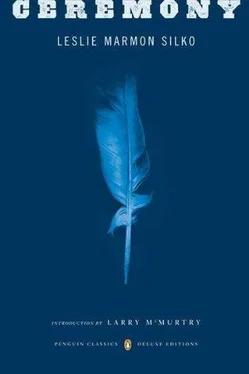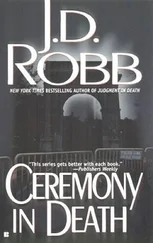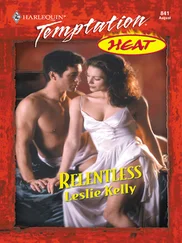He dreamed with her, dreams that lasted all night, dreams full of warm deep caressing and lingering desire which left him sleeping peacefully until dawn, when he would wake up at the first dim light with her presence and the feeling that she had been with him all night. He got up then, moving quietly in the dark house, hearing the snores of Robert and old Grandma. Auntie slept too quietly, and on these mornings when he buttoned up his jacket and went out the door, he imagined she was watching him.
He stood on the edge of the sandrock shelf that underlay Laguna and looked east across the river before dawn.
“Sunrise, sunrise.” His words made vapor in the cold morning, and he felt he was living with her this way. He walked back to the house, with the sun climbing behind him, warming his back, and he chopped wood and waited until he smelled smoke from the stovepipe. Then he carried an armload of kindling inside. Sometimes Auntie looked at him in a way that could only mean she was recalling the winters before, when he had lain in the bed vomiting and crying.
He had been working with Robert every day, hauling loads of juniper and piñon for the woodpile, bringing coal from Cañoncito to shovel into the shed. They checked on the speckled cattle once a week to see if they had left the canyons around the springs; but the cattle seemed content to stay there, at least for the winter. They took soda pop and comic books to Pinkie at sheep camp.
Pinkie leaned against the juniper logs of the sheep pen. He kept his thin arms pulled close to his sides and his hands jammed tight in the front pockets of his jeans. He wasn’t paying any attention to Robert or Tayo, who were examining the old ewes. He stared off in the distance toward Gallup. The shirttails of his short-sleeve pearl-button western shirt flapped around him in the wind. He never tucked in shirttails, not even in the Army, he said, where he spent a month in the brig for it. His face was sullen when he talked about it.
They wrestled with a pregnant ewe that bleated and tried to jerk her manure-stained hind legs from their hands. They didn’t want to throw her down, and Tayo looked up from the struggling animal to see if Pinkie was coming to help out by grabbing hold of her head. But he was looking the other way, oblivious to the scuffling and noise, opening the blades on his pocketknife, one by one, and stabbing them into the juniper post.
When they were ready to leave that day, Pinkie came out of the little stone sheep-camp house. He was wearing his sunglasses with the dark blue lenses and a new black cowboy hat. He carried the rest of his things in a shopping bag. Tayo moved over on the truck seat to make room for him. Nobody said anything because Pinkie had already stayed at sheep camp a week longer than he ever had before.
“Drop me off at the highway,” he said.
The March winds were warm, and they melted the snow. The road was rutted in sticky red mud, and Robert had to put the truck in low gear and gun it to cross the flats by Prairie Dog hill. They bounced and skidded, and Pinkie braced his hand against the dashboard. The wheels slipped but then pulled again, and Tayo could feel by the momentum of the truck that they’d make it. They stopped at the highway to wipe the mud off the windshield. Pinkie got out. He pulled his hat down low over his eyes and picked up his shopping bag. He walked down the highway with his thumb high in the air, and he didn’t look back. He was going “up the line,” to walk, hitchhike, and maybe ride in Leroy’s truck, up Highway 66 to Dixie Tavern, San Fidel, Cerritos, all the way to Gallup and back again, with stops in between — Bibo, the Y — until the money ran out.
He was dreaming of her arms around him strong, when the rain on the tin roof woke him up. But the feeling he had, the love he felt from her, remained. The wet earth smell came in the window that Robert had propped open with an old shoe the night before. He was overwhelmed by the love he felt for her; tears filled his eyes and the ache in his throat ran deep into his chest. He ran down the hill to the river, through the light rain until the pain faded like fog mist. He stood and watched the rainy dawn, and he knew he would find her again.
A few days before the end of May he told them he was going to the ranch to stay. Robert nodded; he was busy with the fields at New Laguna, and, this way, Tayo could look after the cattle and new calves. Auntie looked up from a black book of Church devotions, one she’d been reading since Easter. She looked satisfied, as if she had been waiting all winter for him to say something like that.
“I don’t want any of those others around. They can do their drinking some place else. Not at our place.” Her face was stiff, and her lips barely moved as she spoke. She had expected that sooner or later he would want to go off with the others, Pinkie and Harley and the rest of them, to go drinking and hell raising — to give her more to worry over — the same things his mother had done, to bring disgrace to the family.
“Gather up some Indian tea for me,” old Grandma called to him from the back room. “You hear me? I said pick me some tea.” She came through the door shuffling more slowly than last year, using her cane all the time now. She still wore her black sweater and the blanket leggings, although the weather had been warm for some time now. When she sat down next to her stove, her movements were stiff and slow.
“One more thing,” old Grandma said, “one more thing, Tayo. Old man Ku’oosh came around the other day. He said maybe pretty soon you would have something to tell them. He said maybe you would go talk to them sometime.”
After Robert had driven away, he walked around. The yellow striped cat and the black goat followed him. The cat pounced on grasshoppers in the green tumbleweeds and ate them from the curve of her claws. The goat lagged behind to nibble sprouts of new grass before tossing her head and bounding after him to catch up again. The red clay flats had dried into brittle curls where the standing water had been baked out by the sun. But shining under the sun as far as he could see down the valley, many more puddles remained, full of red muddy water. The valley was green, from the yellow sandstone mesas in the northwest to the black lava hills to the south. But it was not the green color of the jungles, suffocating and strangling the earth. The new growth covered the earth lightly, each blade of grass, each leaf and stem with space between as if planted by a thin summer wind. There were no dusty red winds spinning across the flats this year.
The gray mule was gone, his bones unfolding somewhere on the red dirt, bleaching white and thin in the sun. The changes pulled against themselves inside him; the mule had been blind and old. But his room was the same, the creaking bedsprings and frame pushed into the southeast corner below the small window. The terror of the dreaming he had done on this bed was gone, uprooted from his belly; and the woman had filled the hollow spaces with new dreams.
The buzzing of grasshopper wings came from the weeds in the yard, and the sound made his backbone loose. He lay back in the red dust on the old mattress and closed his eyes. The dreams had been terror at loss, at something lost forever; but nothing was lost; all was retained between the sky and the earth, and within himself. He had lost nothing. The snow-covered mountain remained, without regard to titles of ownership or the white ranchers who thought they possessed it. They logged the trees, they killed the deer, bear, and mountain lions, they built their fences high; but the mountain was far greater than any or all of these things. The mountain outdistanced their destruction, just as love had outdistanced death. The mountain could not be lost to them, because it was in their bones; Josiah and Rocky were not far away. They were close; they had always been close. And he loved them then as he had always loved them, the feeling pulsing over him as strong as it had ever been. They loved him that way; he could still feel the love they had for him. The damage that had been done had never reached this feeling. This feeling was their life, vitality locked deep in blood memory, and the people were strong, and the fifth world endured, and nothing was ever lost as long as the love remained.
Читать дальше












